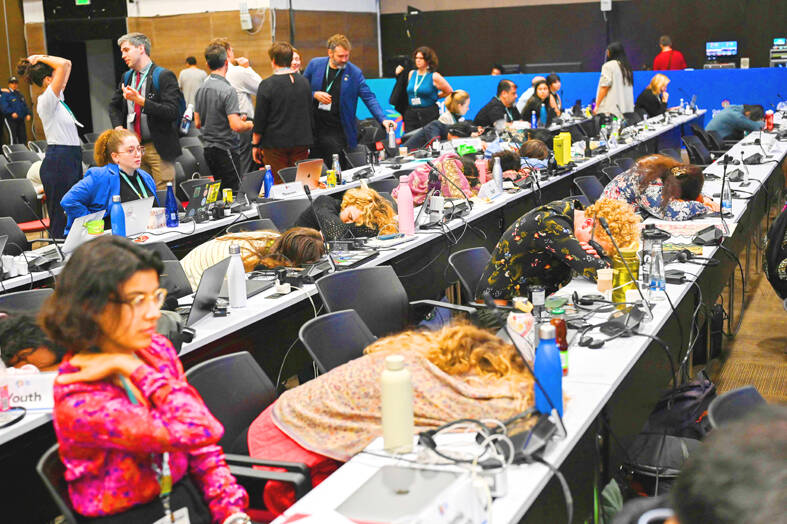A UN nature summit in Colombia yesterday agreed on the creation of a fund to share the profits of digitally sequenced genetic data taken from animals and plants with the communities they come from.
Such data, much of it from species found in poor countries, is notably used in medicines and cosmetics that can make their developers billions.
Few, if any, benefits of the data — often downloaded from free-access online databases — ever trickle down to the communities who discovered a species’ usefulness in the first place.

Photo: AFP
The issue had been a bone of contention at the 16th UN Biodiversity Conference of the Parties (COP16) to the UN Convention on Biological Diversity that opened in Cali nearly two weeks ago.
The previous summit, COP15 in Montreal, had agreed on the creation of a “multilateral mechanism” for sharing the benefits of digitally sequenced genetic information (DSI), “including a global fund.”
However, in Cali, negotiators argued for nearly two weeks over basic questions such as who pays, how much, into which fund and to whom the money should go.
After a last-minute compromise, member countries of the convention agreed on the creation of a “Cali Fund” for the equitable sharing of DSI benefits.
The agreement determines that users who commercially benefit from DSI “should contribute a proportion of their profits or revenue to the global fund.”
Those whose income exceeds a certain income threshold should contribute one percent of profits or 0.1 percent of revenue, the document determined.
The nonbinding agreement lists targeted sectors including the producers of pharmaceuticals, food and health supplements, cosmetics, biotechnology, and agribusiness.
UN Secretary-General Antonio Guterres had urged delegates at the start of the talks to approve a mechanism to govern DSI use so that benefits can be shared equitably.
“Developing countries are being plundered,” he said.
“Digitized DNA from biodiversity underpins scientific discoveries and economic growth, but developing countries don’t gain fairly from these advances — despite being home to extraordinary richness,” he said.
Scheduled to close on Friday, the summit ran many hours into overtime as delegates quarreled over the minutiae of text.
Many delegates had already left the conference by the time the deal was adopted, rushing to catch planes back home.

The CIA has a message for Chinese government officials worried about their place in Chinese President Xi Jinping’s (習近平) government: Come work with us. The agency released two Mandarin-language videos on social media on Thursday inviting disgruntled officials to contact the CIA. The recruitment videos posted on YouTube and X racked up more than 5 million views combined in their first day. The outreach comes as CIA Director John Ratcliffe has vowed to boost the agency’s use of intelligence from human sources and its focus on China, which has recently targeted US officials with its own espionage operations. The videos are “aimed at

STEADFAST FRIEND: The bills encourage increased Taiwan-US engagement and address China’s distortion of UN Resolution 2758 to isolate Taiwan internationally The Presidential Office yesterday thanked the US House of Representatives for unanimously passing two Taiwan-related bills highlighting its solid support for Taiwan’s democracy and global participation, and for deepening bilateral relations. One of the bills, the Taiwan Assurance Implementation Act, requires the US Department of State to periodically review its guidelines for engagement with Taiwan, and report to the US Congress on the guidelines and plans to lift self-imposed limitations on US-Taiwan engagement. The other bill is the Taiwan International Solidarity Act, which clarifies that UN Resolution 2758 does not address the issue of the representation of Taiwan or its people in

US Indo-Pacific Commander Admiral Samuel Paparo on Friday expressed concern over the rate at which China is diversifying its military exercises, the Financial Times (FT) reported on Saturday. “The rates of change on the depth and breadth of their exercises is the one non-linear effect that I’ve seen in the last year that wakes me up at night or keeps me up at night,” Paparo was quoted by FT as saying while attending the annual Sedona Forum at the McCain Institute in Arizona. Paparo also expressed concern over the speed with which China was expanding its military. While the US

SHIFT: Taiwan’s better-than-expected first-quarter GDP and signs of weakness in the US have driven global capital back to emerging markets, the central bank head said The central bank yesterday blamed market speculation for the steep rise in the local currency, and urged exporters and financial institutions to stay calm and stop panic sell-offs to avoid hurting their own profitability. The nation’s top monetary policymaker said that it would step in, if necessary, to maintain order and stability in the foreign exchange market. The remarks came as the NT dollar yesterday closed up NT$0.919 to NT$30.145 against the US dollar in Taipei trading, after rising as high as NT$29.59 in intraday trading. The local currency has surged 5.85 percent against the greenback over the past two sessions, central